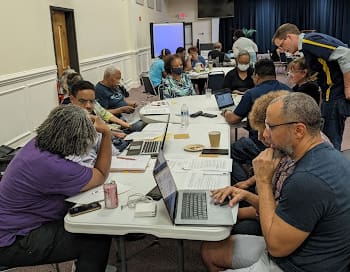
We are excited to share more about the Community Justice Collaborative, a Triangle-region pilot initiative of the North Carolina Housing Coalition. The Collaborative will support and connect community-led efforts in historically Black communities across the Triangle to mobilize housing justice tools and community development strategies that help prevent displacement and support community self-determination and racial equity.
The pilot Community Justice Collaborative rose out of dialogue over the last year with leaders and organizers in nearly a dozen historically Black neighborhoods in Durham, Raleigh, and Chapel Hill concerned about the ways the rising real estate market has accelerated gentrification, decreased affordable housing options, and threatened the fabric of historically Black neighborhoods. In response, many of the historically Black communities have organized powerful efforts to advocate for housing and community justice and pursue equitable community-led development. And yet, communities’ efforts to retain long-term residents and provide housing options for diverse families have faced challenges such as the rise in housing costs, skyrocketing property taxes, and predatory investment. In these conversations, neighborhood organizers and organizational leaders expressed an interest in joining their housing justice efforts while utilizing collective land control and anti-displacement tools.
The Community Justice Collaborative is a direct response to these grassroots conversations. The Collaborative will connect these community-led anti-displacement efforts with each other and provide embedded technical support for housing and community development work in historically Black neighborhoods across the Triangle facing varying stages of gentrification. Specifically, this program aims to:
- Organize regional gatherings between historically Black neighborhoods that deepen tool sharing, strengthen advocacy efforts, and inform housing justice strategies in other communities facing gentrification statewide.
- Support anti-displacement organizing efforts with data analysis and policy strategy to identify systemic problems, strengthen community-led advocacy efforts, and combat racial inequities that undergird gentrification.
- Strengthen neighborhood efforts to combat displacement and land loss by assisting with the design and development of long-term neighbor retention strategies: home repair and property tax mitigation programs, property tax equity analysis and advocacy, holistic estate and community planning, and creative placemaking that honors neighborhood history as it educates the next generation of neighbors.
- Facilitate emerging neighborhood-collective efforts to mobilize and structure community development, real estate, and land-banking strategies to fulfill community aspirations and increase housing options under community control.
Mobilizing Around Property Tax Appeals

Recent statewide property tax equity analysis shows that lower income communities of color are paying nearly double the property taxes of higher income residents per dollar of market value and yet have appeal rates that are far lower, resulting in millions of dollars of lost wealth in historically Black neighborhoods and contributing to displacement pressures. Last Monday, nearly 75 long-term Black residents filled the fellowship hall at Martin Street Baptist in Raleigh to participate in a property tax justice meeting and tax appeal workshop. The gathering was organized by lifetime community leaders from the Men of Southeast Raleigh, an organization formed to fight displacement and support the historically Black neighborhoods. At the meeting, the Community Justice Collaborative shared information about property tax inequities and their impact on communities of color and worked with community leaders to analyze Wake County neighborhoods for property tax inequities. Days later at Southeast Raleigh Table Church, the Community Justice Collaborative helped organize a group of volunteers – attorneys, housing advocates, real estate brokers, and local leaders – to support dozens of community members in researching their property values, filing appeals, applying for tax relief, and discussing broader advocacy strategies for property tax justice. While this initial push focused on supporting individuals, it has led to a groundswell of lifetime neighbors and housing advocates interested in participating in coalition efforts to expand state property tax relief programs, challenge neighborhood and city-wide inequities, and shape a more just property tax system at every level. These property tax events are examples of how the Community Justice Collaborative will build on the power of local organizing, support community-led efforts, and link communities together in broader advocacy efforts for housing justice
What’s Next for the Community Justice Collaborative?
The Collaborative will host its first collective regional gathering and strategy session of cohort neighborhoods in August. In preparation, the Collaborative will be working alongside neighborhood leaders and partner organizations to support ongoing anti-displacement work, to co-design the alliance building work, and to mobilize a data infrastructure for upcoming property tax equity equity work in Durham and Orange Counties. The Collaborative will be organizing a cadre of real estate professionals, land planners, architects, and housing justice practitioners interested in participating in anti-displacement strategy work to come. If you are interested in learning more and volunteering to support community self-determination efforts, please contact the Director of the Community Justice Collaborative, Hudson Vaughan.








